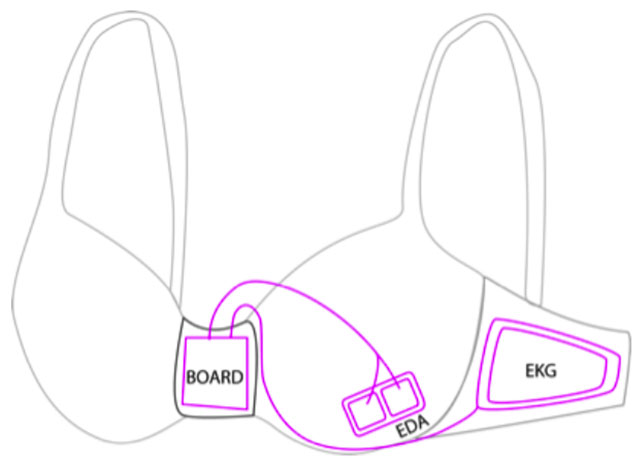The second area of study sought to assess how useful the proposed breathing exercises were at combating stress and emotional eating through surveys. 87.5 percent of participants said that they were becoming more aware of their emotional triggers, but only 37.5 percent reported that their eating behaviours changed as a result. The volunteers were invited to suggest alternative interventions, with ideas such as distracting funny content, meditation, brain teasers, and calling a friend emerging.
The third part dealt involved the development of a bra-mounted wearable sensor system that gathered EKG and EDA data in order to monitor the emotional state of the wearer. The EKG sensor pads were designed to fit snugly against the ribs, while the EDA sensor was designed to sit inside the bra cap to essentially measure boob sweat.
Four women tested the bra system while also using EmoTree app so that researchers could cross-reference the data. They wore the sensing system and reported their emotions for between four and six hours each day. “It was very tedious for participants to wear our prototyped sensing system as the boards had to be recharged every three to four hours, which resulted in participants having to finagle with their wardrobe throughout the day,” explain the authors.
The system was successful in measuring arousal (how alert or bored person is) and valence (how positive or negative emotions are) in between 73 and 75 percent of the time.
“Based on these results, we conclude that building a wearable, physiological system is feasible,” say the authors. “However, we will continue to explore how to build a robust, real-world system that stands up to every day challenges with regards to battery life, comfort, and being suitable for both men and women.”
The next stage of research will involve taking real-time sensor data instead of log files and trying to predict emotions and show an appropriately timed, personalized intervention.
Since conducting this research, the team has moved to testing the use of Affectiva Q3 bracelets, which detect mood, so that both men and women can participate. The pilots, say the authors, have been “quite promising” for both sexes.
This story originally appeared on Wired UK.

